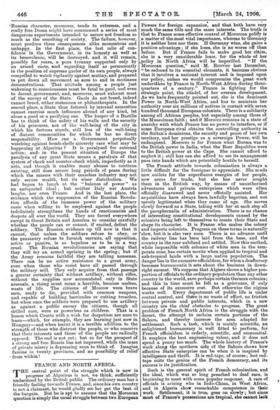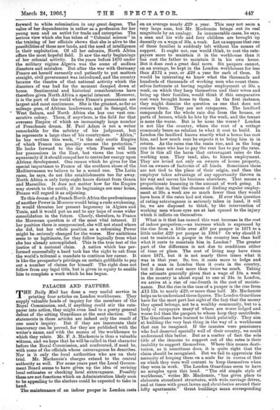FRANCE AND NORTH AFRICA. T HE central point of the struggle
which is now in progress at Algeciras is ' not, we think, sufficiently understood by the British public. The ordinary man has a friendly feelbig towards France, and, since his own country is not a claimant, he would gladly see her get the best of the bargain. But he is apt to assume that the Moroccan question is simply the usual struggle between two European Powers' for foreign expansion, and that both have very much the same title and the same interests. The truth is that to France some effective control of Moroccan polity is a matter of the most vital importance, whereas to Germany it is neither here nor there. If Germany wins, she gains a positive advantage ; if she loses, she is no worse off than before. But if France fails to make good her claim, she is a very considerable loser, for the whole of her ,policy in North Africa will be imperilled. " If the Moroccan question," said M. Rouvier last December, " be reduced to its essential elements, it becomes obvious that it involves a national interest and is imposed upon our policy, unless we would compromise the great work undertaken by France in North-West Africa during three- quarters of a century." France is fighting for the strategic point, the citadel, of her oversew development. As we have frequently pointed out, she is the dominant Power in North-West Africa, and has to maintain her authority over six millions of natives in contact with seven hundred thousand European colonists. There is a solidarity among all African peoples, but especially among those of the Mussulman faith ; and if Morocco remains in a state of anarchy with which France has no power to interfere, or if some European rival obtains the controlling authority in the Sultan's dominions, the security and peace of her own territory, and her prestige as a sovereign Power, will be endangered. Morocco is for France what Burma was to the British power in India, what the Boer Republics were to the British power at the Cape. She cannot afford to neglect it ; still less can she afford to see its management pass into hands which are potentially hostile to herself.
The French attitude towards colonisation is always a little difficult for the foreigner to appreciate. She needs new outlets for the superfluous energies of her people, new areas for trade, but she has never sought them in the British way, by means of unauthorised adventures and private enterprises which were often officially disavowed and never officially assisted. Her . acquisitions have always been lawfully begotteiy, and not merely legitimated when they came of age. She moves slowly forward as a State, taking with her at each step all the paraphernalia of administration. There is no chance of interesting constitutional developments caused by the colonists being left to themselves to create their State and shape its character. It is France who makes the colony and imports colonists. Progress on these terms is naturally 'slow, but it is also very sure. There is no advance until the railway line has been laid from the base, and the country in the rear subdued and settled. Now this method, while impossible with colonies of white men in the tem- perate zone, has certain merits when applied to tropical and sub-tropical lands with a large native population. The danger lies in the excessive officialdom, for when a demsocracy becomes bureaucratic it sets about the business in down- right earnest. We suppose that Algiers'shows a higher pro- portion of officials to the ordinary population than any other country in the world, save perhaps certain German colonies; and this in time must be felt as a grievance, if only because of its excessive cost. But otherwise the regime works well. Every department of public life is under central control, and there is no waste of effort, no friction between private and public interests, which in a new country are the chief obstacles to progress. The great problem of French North Africa is the struggle with the desert, the attempt to reclaim certain portions of the Sahara, and thereby increase the area adapted for settlement. Such a task, which is mainly scientific, an enlightened bureaucracy is well fitted to perform, for French officialdom is orderly, scientific, and economical. It employs the best enginebring talent, and it does not spend. a penny too much. The whole history of France's work along the northern side of the Sahara shows how, effective Stab; enterprise can be when it is inspired by intelligence and thrift. It is red-tape, of course ; but red- tape suits the genius of the French democracy, and its success is its justification.
Such is the general spirit of French colonisation, and the ideal, which was so long preached to deaf ears, is beginning to meet with some popular response. A race of officials is arising who in Indo-China, in West Africa, and in Algeria show remarkable competence in their work. Settlement, it is true, goes on slowly ; but since most of France's possessions are tropidal, she cannot look forward to white colonisation in any great degree. The value of her dependencies is rather as a profession for her young men and an outlet for trade and enterprise. The serious view which she has taken of " Colonial science" in the training of her officials shows that she is alive to the possibilities of these new lands, and the need of intelligence in their exploitation. Of all her colonies, North Africa offers the most hopeful field. It saw the early beginnings of her colonial activity. In the years before 1870 under the military regime Algeria was the scene of endless disasters and mistakes. But after the war with Germany France set herself earnestly and patiently to put matters straight, civil government was introduced, and the country became the theatre of that national activity which the disasters of war had for the moment damped down at home. Sentimental and historical considerations have therefore given North Africa a special interest. Moreover, it is the part of the world where France's possessions are largest and most continuous. She is the greatest, so far as mileage goes, of African landowners, and in Senegal, the West Sahara, and North Africa she has one vast con- secutive colony. There, if anywhere, is the field for that overseas Empire of which an increasingly large number of Frenchmen dream. M. Paul Adam is not a writer remarkable for the sobriety of his judgment, but he represents a large class of his countrymen. "Africa," he has written this week, " is the only exotic Empire of which France can possibly assume the protection." He looks forward to the day when France will lose her possessions in the East, but views the loss with equanimity if it should compel her to centre her energy upon African development. One reason which he gives for the special importance to France of the southern shore of the Mediterranean we believe to be a sound one. The Latin races, he says, do not like establishments too .far away. North Africa is only forty-eight hours distant from Genoa and Marseilles. It does not matter how far the Empire may stretch to the south; if its beginnings are near home, France will regard it as adjoining.
To this dream of a French North Africa the predominance of another Power in Morocco would bring a rude awakening. It would threaten her present hegemony in Algiers and Tunis, and it would put an end to any hope of some wider consolidation in the future. Clearly, therefore, to France the Moroccan question is of the most vital interest. If her position there is compromised, she will not stand where she did, but her whole position as a colonising Power might be. seriously changed for the worse. Her ambitions seem to us legitimate, for they follow logically from what she has already accomplished. This is the true test of the justice of ft national claim. A nation which has per- formed successfully a hard task has the right to ask from the world's tribunal a mandate to continue her career. It is like the prospector's privilege on certain goldfields to peg out a number of claims for himself. The right does not follow from any legal title, but is given in equity to enable him to complete a work which he has begun.











































 Previous page
Previous page